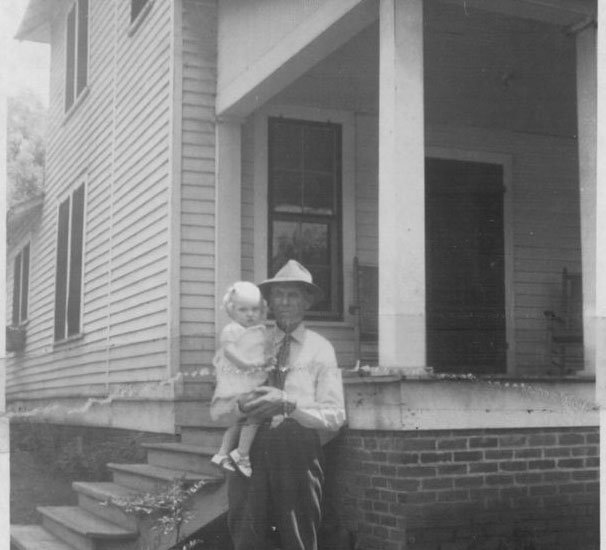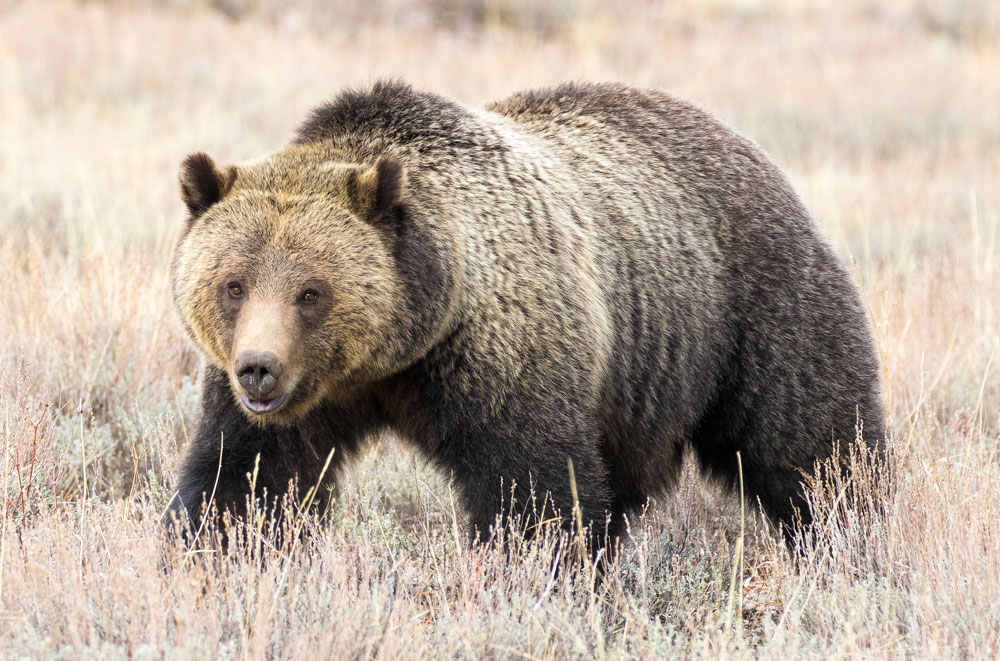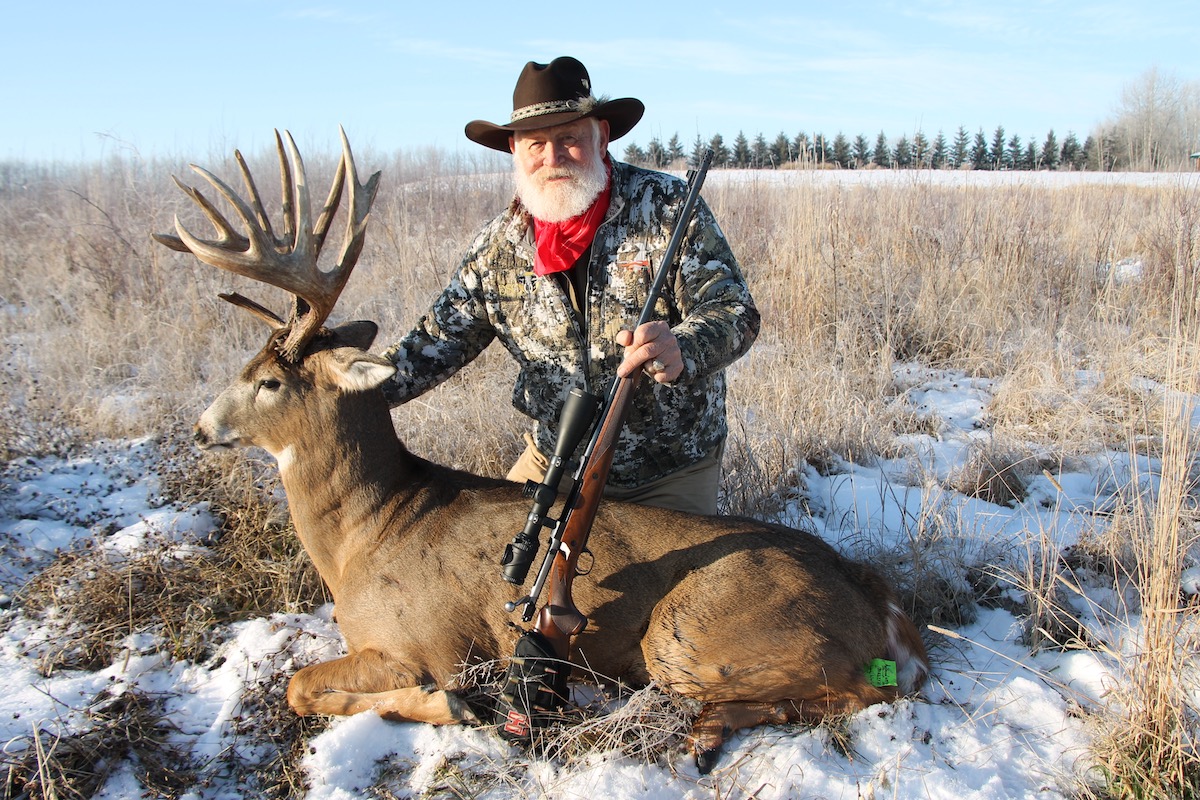Porches were a place where you could be at peace with the world…a stage for stories.
In yesteryear one of many blessings, what folks living in my native heath, the Great Smoky Mountains of North Carolina, tended to take for granted was that they could enjoy their porches pretty much any time except in the heart of winter. It was a time when air conditioning was virtually non-existent, and the thought of special heating devices for use of open porches during chilly weather would have brought laughter and quite possibly downright ridicule. But porches saw plenty of use–on balmy spring days, throughout the summer in early morning and from late afternoon until bedtime, and well into autumn when Indian Summer temperatures held sway. With a fan or shade trees, even mid-day in the summer could be tolerable. Similarly, a flannel shirt or lightweight sweater made chilly fall evenings perfectly comfortable. Certainly the lengthy annual run of what might be styled the “porch season” in the high hills of the southern Appalachians was a real blessing.
Accompanying today’s world of near addiction to television, computer screens, IPods, “do everything” phones and obsession with technology comes a seeming compulsion to be indoors. As a result, porches don’t loom nearly as large in everyday life as was once the case. Yet I’d like to sing the praises of porches, and much of my tribute comes directly from countless wondrous hours spent on them, mostly on the ones at my boyhood home or that of my paternal grandparents. Of course there were porches aplenty elsewhere–summertime courtships where I had neither the money nor the transportation to do anything but visit (they also provided a welcome bit of privacy), picking and grinning sessions on summer evenings, visits with friends or relatives, and much more.
When visitors came a-calling, weather permitting we adjourned to the porch overlooking the town and offering vistas of nearby mountain ranges. It was a grand place to be when thunderstorms threatened, and watching rains falling on distant ridgelines, with flashes of lightning momentarily brightening the sky, was, for me, pure delight.
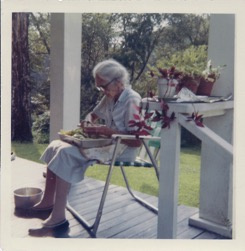
Grandma Minnie peeling apples on the porch where the author heard so many grand tales.
The porch of my boyhood home was a cherished hangout for my sister. She would sing and rock for hours on end, and on one occasion when Daddy accidentally ran over a cat in the driveway, she purt nigh drove the rest of the household crazy with mournful tunes that in essence amounted to unending dirges. It was also a place to watch lightning bugs as light gave way to night, to observe “goings on” in downtown Bryson City, or during the day to watch birds go about their business. A pair of screech owls that raised several generations of young in a huge white oak located nearby added to the overall appeal and ambiance. During the summer and early fall there was the added bonus a chorus of grasshoppers, katydids, and jar flies providing background music.
Porches were a place for relaxation at day’s end, but they also witnessed plenty of work. Indeed, quite often labor and rest went hand in hand. Sometimes a number of family members would gather to talk, but when they did so, more often than not, their hands were busy. The job might involve stringing and breaking beans for a run of canning the next morning; shelling crowder peas or lima beans with the same end result in mind; peeling and quartering apples, either for drying or canning; working up a bushel or two of corn (shucking, scrubbing away silks, then cutting from the cob) for soup mix; cutting up okra; sorting through peaches beginning to go bad that Mom had bought to make preserves; and the like. More often than not, a prelude of porch work was part of the overall process of canning.
Occasionally, usually on a Sunday afternoon during the summer, there would be a run of hand-churned ice cream. I don’t ever recall doing this at home but it happened periodically at the residence of Grandpa Joe and Grandma Minnie, usually when a bunch of cousins from out of town visited or maybe when a lot of us got together for a family meal.
These varied recollections warm the cockles of my heart, but of all things associated with porches, the most memorable were porch-sitting sessions with no one involved except Grandpa Joe and me. Sometimes this came when we had been placed in verbal exile (that is to say, Grandma had told us, in no uncertain terms, to “get out from under foot and out of the house”). Grandpa would mutter something about “they” not appreciating us (although his application of the impersonal pronoun “they” in place of Grandma’s name never eased the brunt of her ready wrath) and we would retreat to the porch. It was a great setting, looking out over the nearby Tuckaseigee River and close enough to hear the stream whisper and murmur as its waters rolled by in their long journey to the Little Tennessee, Tennessee, and mighty Mississippi rivers before eventually entering the Gulf of Mexico.
On the porch Grandpa would take his throne, a comfortable rocking chair made of locust and with a padded bottom. Before long I would have induced him to share tales of old long ago, setting this stage for stories.
Grandpa was a natural, gifted storyteller and it didn’t take much—just a request for a re-run of some oft-told tale—and magic would unfold. I could sit enchanted for hours, doing little other than offering a bit of encouragement or tendering an occasional expression of rapt interest, as he relived what was clearly a rugged but exciting time in his life.
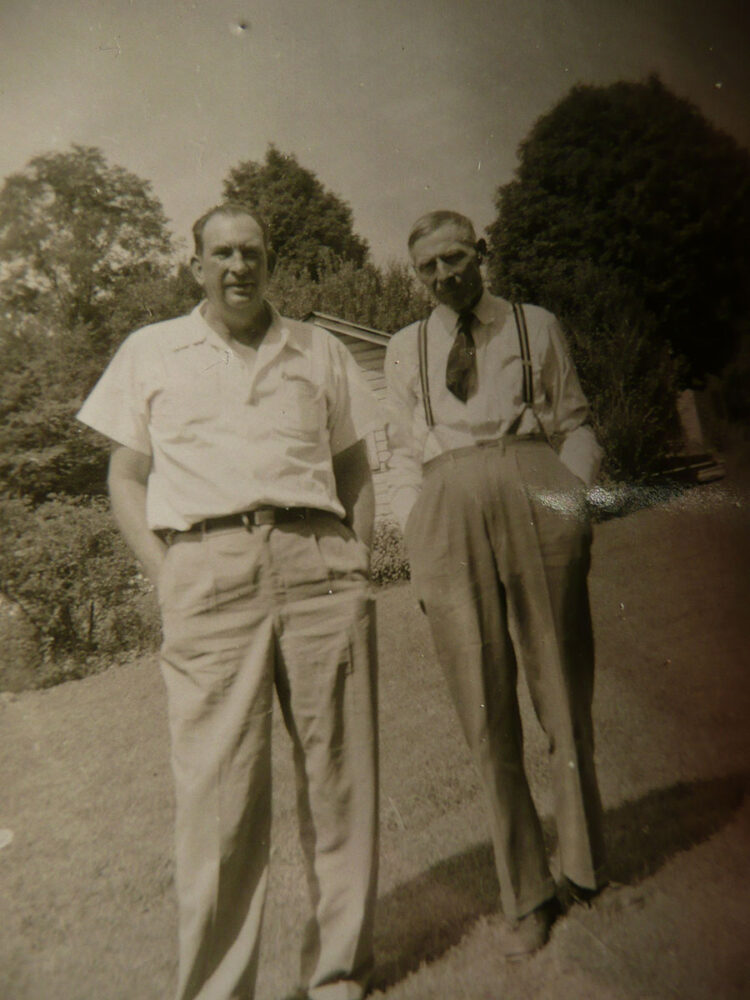
Grandpa Joe standing in the yard of his little farm with one of his son-in-laws.
For the most part, his tales from the late 19th century involved simple things—squirrel hunting, the quest for “pheasants” (his word for grouse), the bounty of the American chestnut, catching rabbits by hand after an exceptionally deep, soft snow which temporarily left them more-or-less immobile, fishing outings for speckled trout (what everyone in the area called brook trout), and the like. Still, his accounts held me spellbound, and without question the setting added to their splendor.
Perhaps sharing a couple of Grandpa’s tales will offer a small window on the fascination they held for a boy who was crazy about pretty much any and all aspects of the natural world. One story I begged for time and again involved him killing a cougar back when they were still present in the region. Like everyone in the area, he called them “painters”, and the origins of his encounter with one resulted from the big cat’s repeated incursions into the family chicken house.
After this had occurred on multiple occasions, Grandpa was awakened one night by squawking from the lot where the chickens roosted—some in trees and others in the ramshackle “house” where there were nest boxes and long poles parallel to the ground for roosting. He grabbed his shotgun, which was rather unsuitably loaded since it held #6 shot he used on squirrels, and rushed to the lot. As he approached overhead, movement attracted his attention and he saw the cougar atop the chicken house roof. At that moment the big cat sprang into the air—maybe to escape or maybe to attack, although Grandpa Joe liked to put matters in the latter context. Whatever the case, he shot it in mid-leap and the full charge of pellets hit the panther at a distance of only a few feet. Grandpa always chuckled when he reached this point and reckoned he had to be one of the few fellows who ever “wing shot a panther.”
Another tale he loved to relate on this stage for stories involved catching what he described as “a mighty jackfish.” It was not until years after his death that I finally figured out that the fish he described was a muskie. Although it is not widely known, the species is found in the larger streams of the southern Appalachians that form a part of the Mississippi River drainage.
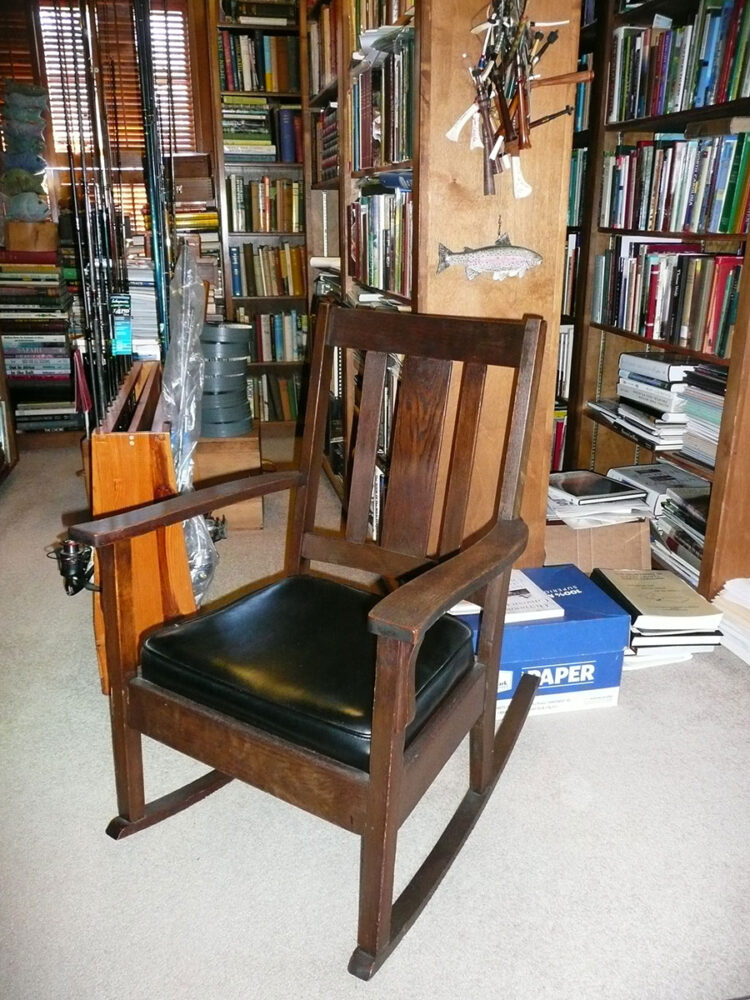
Grandpa Joe’s rocking chair, which now resides comfortably close by where the words of many stories are typed.
This particular fish was hooked not by rod and reel, but on a trot line set for catfish. When Grandpa got into his homemade, flat-bottomed boat and began to pole along to check for fish, he immediately noticed the trot line was throbbing, a sure indication of a big fish. He removed a couple of small channel catfish and as he approach midstream realized the large fish was close at hand. When he lifted it up and pulled the jackfish into the boat, chaos ensued. Evidently the fish had only recently been hooked and it was “fresh” enough to wreak havoc. “It about beat me and the boat to pieces,” Grandpa said, before I finally hit it in the head with a good-sized rock. Meanwhile, he had accumulated several cuts on his hand from the fish’s sharp teeth and in his description “I was bleeding like one of them hogs we butcher every year right before Thanksgiving.” The muskie measured over four feet in length, a veritable giant for mountain waters.
Tales like these were regular porch fare, and in and of themselves they would have more than sufficed to tempt and titillate a youngster addicted to pretty much anything associated with the outdoors. Add to that sort of porch pleasure regular opportunities to enjoy an icy watermelon or just a cold glass of water while resting after hard hours of hoeing corn, and the overall picture emerges of porches being special retreat, a tiny piece of paradise. They were the perfect place for so many things. Family gatherings, courtships, music, relaxation, rest between periods of work, enjoying the soothing movement of a rocking chair, sensing and savoring the rhythm of a gentle rain on a tin roof, and more. Porches were a place where you could be at peace with the world, and as singer/songwriter Tracy Lawrence suggested years ago in a country hit, “If the World Had a Front Porch,” they were a place to hear grand sporting tales – a stage for stories where one could reduce stress, solve problems and slow down life’s often hectic pace.
*********************************************************************************
Jim Casada is the longtime Editor-at-Large and Book Columnist for Sporting Classics. To learn more about his work and many books, or to sign up for his free monthly e-newsletter, visit his website at www.jimcasadaoutdoors.com.
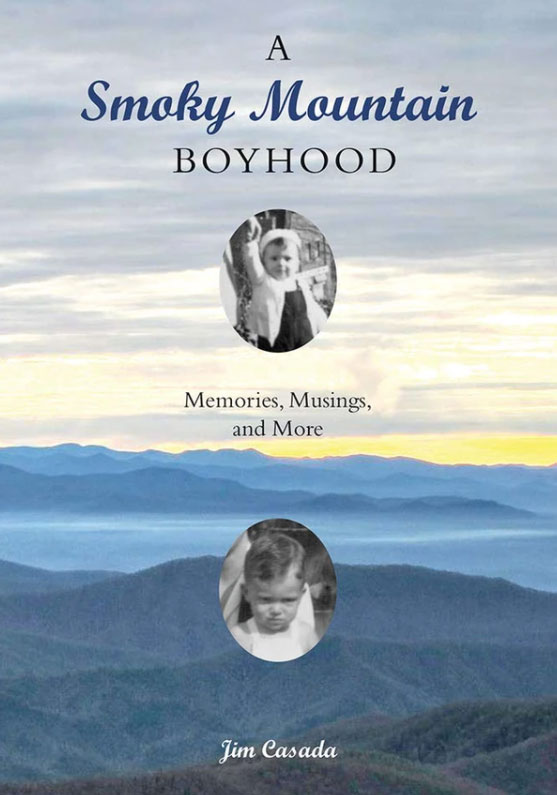 Born in Bryson City, North Carolina, Jim Casada has had a long career as a teacher, author, and avid outdoorsman. He grew up in a time and place where families depended on the land and their community to survive. Many of the Smoky Mountain customs and practices that Casada reflects on are gradually disappearing or have vanished from our collective memories. In A Smoky Mountain Boyhood, Casada pairs his gift for storytelling and his training as a historian to produce a highly readable memoir of mountain life in East Tennessee and western North Carolina. His stories evoke a strong sense of place and reflect richly on the traits that make the people of Southern Appalachia a unique American demographic. Casada discusses traditional folkways; hunting, growing, preparing, and eating wide varieties of food available in the mountain region; and the overall fabric of mountain life. Divided into four main sections—High Country Holiday Tales and Traditions; Seasons of the Smokies; Tools, Toys, and Boyhood Treasures; and Precious Memories—each part reflects on a unique and memorable coming-of-age in the Smokies. Buy Now
Born in Bryson City, North Carolina, Jim Casada has had a long career as a teacher, author, and avid outdoorsman. He grew up in a time and place where families depended on the land and their community to survive. Many of the Smoky Mountain customs and practices that Casada reflects on are gradually disappearing or have vanished from our collective memories. In A Smoky Mountain Boyhood, Casada pairs his gift for storytelling and his training as a historian to produce a highly readable memoir of mountain life in East Tennessee and western North Carolina. His stories evoke a strong sense of place and reflect richly on the traits that make the people of Southern Appalachia a unique American demographic. Casada discusses traditional folkways; hunting, growing, preparing, and eating wide varieties of food available in the mountain region; and the overall fabric of mountain life. Divided into four main sections—High Country Holiday Tales and Traditions; Seasons of the Smokies; Tools, Toys, and Boyhood Treasures; and Precious Memories—each part reflects on a unique and memorable coming-of-age in the Smokies. Buy Now
